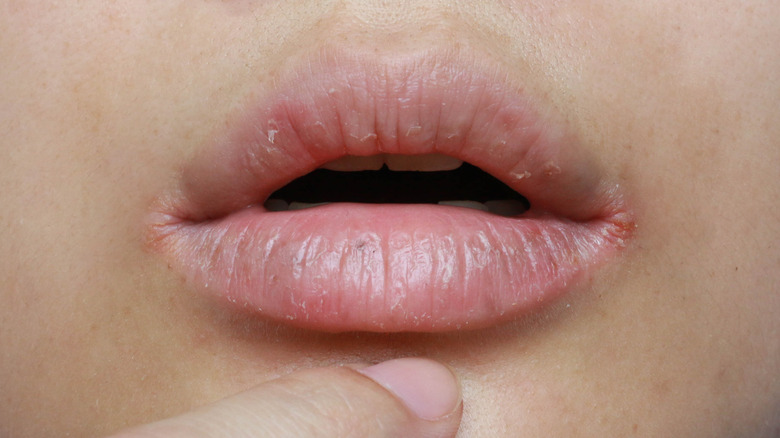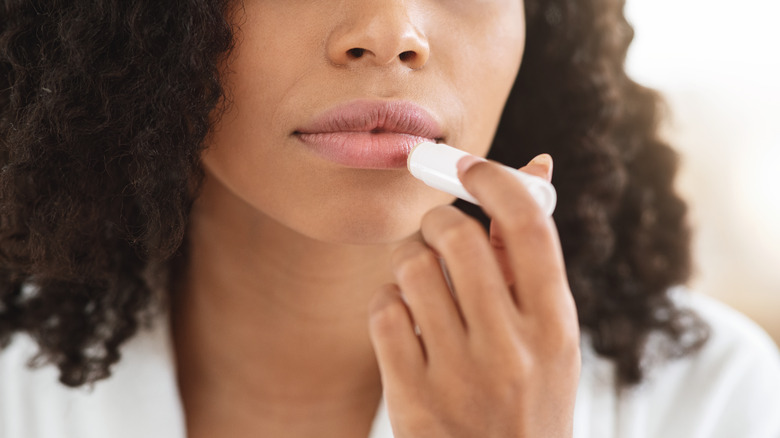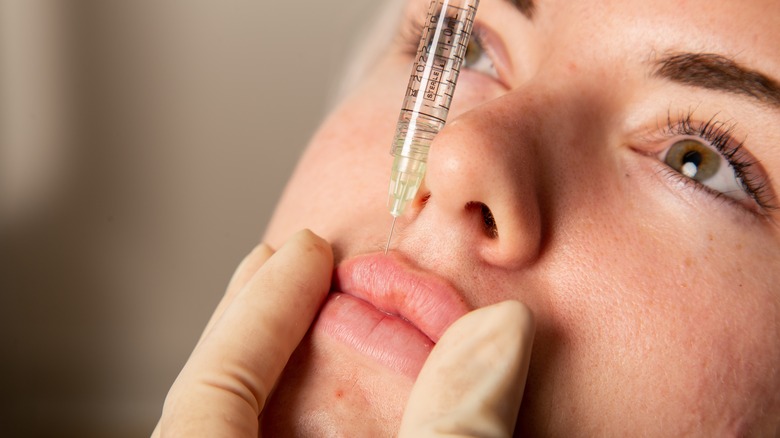Our Best Tips For Healing Cracked Lip Corners Fast
Having dry and chapped lips already feels uncomfortable, but imagine having the corners of your mouth get so dehydrated they end up cracking. Everyday movements such as yawning, talking, taking a sip or a bite, and chewing can feel like agony as the tender skin gets stretched beyond comfort.
Having swollen or cracked lip corners is actually a medical condition known as angular cheilitis. Commonly mistaken for cold sores because of the lesions that develop from it, it's a non-contagious inflammation of the skin that can lead to infection when left vulnerable to bacteria and fungi. Since it's rooted in the body's immune response, coating your lips with your favorite balm and other lip-care products wouldn't do much to alleviate the dryness, much less the pain.
Per Verywell Health, people with diabetes and iron or vitamin B deficiencies are at risk for developing angular cheilitis, as well as those who take isotretinoin as medication. Atopic dermatitis and irritable bowel syndrome are contributing factors as well, according to the National Library of Medicine. "People who are sensitive to yeast or fungal illnesses may have more issues, such as patients who are immunosuppressed," dermatologist Dr. Tracy Evans explained to InStyle. Indeed, a 2022 study cited how the collection of saliva at the corners of the mouth causes this condition since it leads to yeast buildup in these areas. Hence, if you wear dentures or braces, be aware of how these oral contraptions' pressure on the teeth and gums leaves you drooling.
Topical treatment can clear up this condition
If you have swelling or blisters at the corners of your lips, a trip to the dermatologist can clarify if they're cold sores or a case of angular cheilitis. Aside from doing a mouth swab, doctors may also request to get your blood checked for pre-existing illnesses or nutrition issues. After confirming, they would then prescribe a topical corticosteroid to address the inflammation and an antifungal cream to treat the yeast infection. (Verywell Health added that they may also prescribe a topical antibiotic in case of bacterial infection.) The condition usually clears up after two weeks of treatment.
However, angular cheilitis may be a chronic condition for some, according to the Cleveland Clinic. Managing flare-ups may have you buying medication over the counter, especially when you don't have immediate access to a doctor. Mt. Sinai Hospital's Dr. Joshua Zeichner advised (via Self) treating your cracked lip corners with a 1% hydrocortisone cream, followed by antifungal ointment. The dual action is necessary since, as dermatologist Dr. Ted Lain told the publication, "a corticosteroid decreases the immune system where you apply it, so it makes any infection get worse."
Remember, though, that DIY treatment is a resort only after you've had a doctor's consultation. Getting diagnosed by a medical professional is still the first crucial step since cracked lip corners also present as a symptom of other, more serious diseases such as actinic keratosis, leukoplakia, syphilis, and oral cancer, according to the Cleveland Clinic.
Could an aesthetic solution be a preventive measure?
Naturally, prevention is always better than cure, especially with a condition that's as painful and visually distressing as angular cheilitis. Reduce your chances of developing cracked lip corners by avoiding licking your lips whenever they're dry, since this dehydrates them even more once the saliva evaporates. Instead, follow InStyle's tip to apply an occlusive barrier to both sides of the mouth to seal in moisture. Do this before going to bed if you wear braces or dentures and are prone to drooling.
For a more drastic preventive measure, Dr. Evans recommended lip fillers, telling InStyle, "Interestingly, a little bit of Juvéderm Ultra applied in the corners of the mouth (lateral commissures) keeps [them] turned up and can help." However, plastic surgeon Dr. Bethany J. King warned that this solution doesn't apply to everyone. "The only time lip filler would be suitable ... is [with] an older patient with down-turning corners of the mouth and trenches that divert spit downward [and] keep the skin chronically wet," she explained on Real Self. Dermatologic surgeon Dr. Jason Emer also advised on the website to do a sleep study with an expert to check for poor sleeping habits, including open-mouthed breathing and drooling.
It's best to remain vigilant with your oral hygiene "to keep that ecosystem in your mouth in check," recommended oral-medicine specialist Ross Kerr (per Self). He also suggested cutting down your sugar consumption since this is what Candida yeast feeds on.


